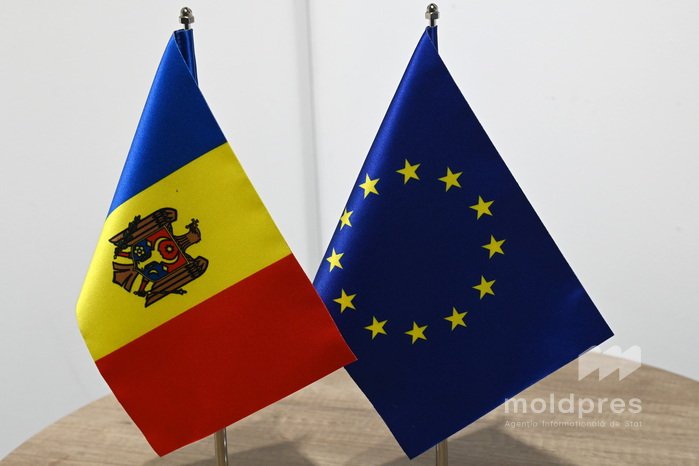
No reason for concern on visa regime with European Union - Government spokesperson says
Government spokesperson Daniel Vodă said that there is no cause for concern about the liberalized visa regime between the Republic of Moldova and the European Union, emphasizing that European authorities have not announced any measures that could affect the status.
'The European Union has created a mechanism to react quickly, if necessary, regarding the visa regime with several states, but this does not concern the biometric passports of Moldovan citizens,' explained Daniel Vodă, referring to a recently approved annex by the European Parliament. According to him, the Republic of Moldova is mentioned in the document only in the context of other types of travel documents, and not the biometric passports which ensure the visa-free regime.
The official pointed out that Moldova maintains its status as a candidate country for EU accession, and its citizens comply with the movement rules in the European area.
'Every year, the Government, together with European structures, presents the report on the implementation of the liberalized visa agreement. Regardless of whether we are talking about the visa regime with the EU or another country, every citizen who travels based on this regime must comply with the conditions of stay in the EU, respect the rules, and, in general, the code of conduct that applies in this context — something that, in the vast majority of cases, is observed, and there are no signs of concern,' he mentioned.
Daniel Vodă urged the public to consult official sources and communications from European institutions to avoid incorrect interpretations.
'Therefore, this decision, in the context of respecting the legislation, within the framework of a political system that clearly has the European development direction as a hallmark, does not pose a threat to the Republic of Moldova. And those voices that try to insinuate this, we invite to read official communications carefully and not to create confusion among citizens,' he emphasized.
The European Parliament adopted on Tuesday, with a vast majority, a significant reform of the visa suspension mechanism for citizens from 61 third countries (including the Republic of Moldova) who currently benefit from visa-free travel in the Schengen area for short stays.
The new provisions, approved by 518 votes in favor, 96 against, and 24 abstentions, give the European Union more effective tools to respond to abuses or threats connected to the visa-free regime. The European Commission will be able to reintroduce the visa requirement temporarily or permanently for certain states in case of security threats, such as a significant increase in crime or unfounded asylum applications, or in situations of non-cooperation in readmission matters.
Expanding the grounds for suspension
In addition to existing criteria, the reform adds new provisions for the suspension of the visa-free regime, including:
- hybrid threats, such as the instrumentalization of migrants;
- 'golden passport' schemes for investors;
- severe deviations from EU foreign policy, including violations of the UN Charter and international humanitarian law;
- non-compliance with international court rulings.
Moreover, for the first time, the EU will be able to target directly third-country government officials responsible for human rights violations by selectively suspending visa exemptions.
New thresholds and clear procedures
The new legislation introduces concrete thresholds for triggering the suspension procedure:
- an increase of at least 30% in the number of over-stayers or serious offenses;
- a recognition rate for asylum applications below 20%.
The Commission can still act outside these thresholds in well-justified cases.
Next steps
After approval by the Parliament, the text is to be formally adopted by the EU Council. The law will come into force 20 days after its publication in the Official Journal of the European Union.
How the system will work
According to the new rules, the European Commission (following a proposal from a member state concerned or on its own initiative and considering information received from any EU institution) can initiate the suspension process for visa-free travel from certain third countries to the Schengen area, first temporarily, then permanently if the issues are not resolved.
Until now, the visa-free system has been revoked only once, in the case of Vanuatu.
Speaker on visit to Bucharest
First meeting of Recean government after elections
President provides details on Transnistria reintegration plan
Moldovan president explains why Russia wanted to take control of power in Moldova
New government might be sworn in in several weeks; Moldovan president says new cabinet to have to carry out many reforms
Legal procedures for establishment of new parliament and cabinet of ministers
Chișinău MPs participate in autumn session of PACE
PHOTO GALLERY // Parliamentary elections on 28 September in focus of international press
US Embassy congratulates Moldova's people for participating in parliamentary elections
Moldovan government's spokesman says cabinet calmly monitors situation in Transnistrian region, responds only based on verified facts
Deputy Prime Minister for Reintegration on gas delivery to Transnistrian region
Moldovan authorities not notified about blockade by of apples' batch
Moldovan wines to have clearer labels
No reason for concern on visa regime with European Union - Government spokesperson says
Medical leave certificates to be issued in digital format as of 1 March 2026
Government spokesperson on yellow rain warning
Digital assessment debut for ninth, twelfth grade pupils in Moldova
STISC announces new cyber attack attempts on government IT infrastructure
Government approved extension of energy compensation for all families in Moldova
Enhanced safety for citizens: National Crime Prevention and Combat Program 2026–2030 approved by Government
Registration process for heating compensation to start in November
Customs procedures to be fully digitalized and interconnected with EU systems by 2030
Government approved digital transformation program for energy sector for 2026–2030
Military Strategy 2025–2035 approved by Government
PHOTO GALLERY // Satiricus Theater tells story in pages of book


